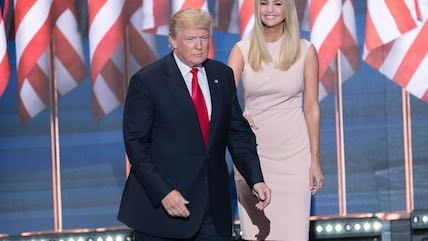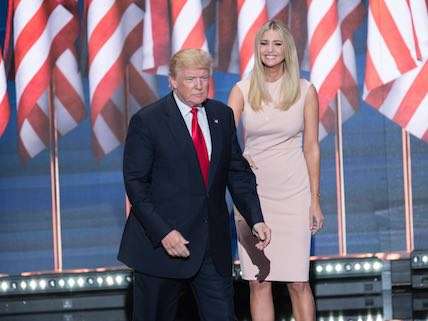Donald Trump Will Never Win Millennials. They Like Capitalism Too Much.
As the Republican National Convention winds to a close, Trump's lack of support among young GOPers has never been more obvious.


In the wake of the 2012 election, it seemed like there was no possible way for the Republican Party to further alienate the under-30 crowd, 60 percent of which voted for President Obama over Mitt Romney. But that was before the GOP added anti-porn language to its platform, doubled down on its dislike of gay people, turned against trade and immigration, and chose Donald Trump to lead it.
And make no mistake, Trump is uniquely unacceptable to young people—even ones who are otherwise part of the GOP.
"It seems like millennial Republicans support Trump to a lesser degree than the older members of the party," said Nick Allman, a 23-year-old delegate to the Republican National Convention, in an interview with Reason. When asked whether he would vote for Trump in the general election, Allman said he wasn't sure.
Pollster Frank Luntz hashed out the party's millennial problem during a session at the RNC earlier this week. "We have lost [millennials]," he told delegates on Tuesday. "It's not like we are losing. We have lost that generation."
Luntz blamed far-left universities for indoctrinating young people.
"The fact that 58 percent [of millennials] say socialism is the better form of economics, that is the damage of academia," said Luntz, according to The Hill.
Of course, it's not actually true that most millennials support socialism (or even know what it is). A Harvard University poll found just the opposite: 59 percent said they did not support socialism. A 2014 Reason-Rupe poll of millennial attitudes discovered that 64 percent of young people preferred a free economy to a government-managed economy.
So perhaps the problem is not that young people are hostile toward free markets—perhaps the problem is that the Republican Party has embraced a candidate who is hostile to free markets: Donald Trump. It's Trump who hates free market capitalism, not millennials. Luntz told his audience that students are learning about economics from professors whose views align with Bernie Sanders. That's a bad thing, but it's completely hypocritical for the GOP to treat it as such, since Trump himself agrees with Sanders on a host of economic issues. He mentions this at every opportunity in hopes of courting Sanders' supporters. He made it clear once again during his convention speech Thursday night. He vowed to put an end to "job-killing trade dels." In choosing Trump, Republican voters decided that the right person to head their ticket was the one candidate who could run to Hillary Clinton's left on economics.
Young people have correctly balked at this choice. Emily Ekins, a research fellow at the Cato Institute, says that Trump badly underperformed with young voters during the primaries.
"Trump tended to perform on average about 9 points lower among young people compared to seniors," wrote Ekins in an email to Reason. "Cruz did disproportionately better among young people by about 4 points and Rubio did disproportionately better among young people by about 5 points."
If there's a silver-lining for the GOP, it's that the DNC has a similar problem. Young voters within the Democratic Party are also dissatisfied with their candidate. They wanted Bernie Sanders, they got Clinton—and older voters forced her on them.
But there are many young Democrats. There are few young Republicans, and there will be even fewer of them within a Republican Party headed by Trump. The millennials whose votes are up for grabs—those who self-identify as non-liberals—are actually most closely identified with libertarianism, a philosophy for which Trump is the antithesis.
It's no wonder then that Libertarian Party candidate Gary Johnson is doing much, much better among millennials than Trump. Johnson actually draws more support from millennials than any other age group. Johnson is even competitive with Trump among all voters under the age of 45. He gets 20 percent of them, whereas Trump only gets 24.
The Libertarian Party has done what the Republican Party could not. It chose an experienced, likeable two-term governor who embodies fiscal responsibility and social tolerance. The Republican Party chose Trump. The Libertarians chose someone who doesn't come across as regressive on nearly all fronts. The Republican Party chose Trump.
If there's one exception to Trump's awfulness, it's that he's arguably better on social issues than many in the GOP (I say arguably, since Trump's actual beliefs are something of a mystery). But the party has corrected for that. The 2016 GOP platform isn't as anti-gay as it was last election cycle—it's more anti-gay. And it's going to cost the Republicans, says Allman.
"I'll be honest with you, that's a big problem, that one piece of the platform," said Allman. "It's going to push many people away. Particularly young people."
Trump surrogates know this is a losing battle, of course, which is why they have tried so forcefully to pivot on social issues. Milo Yiannopoulos, a gay millennial Trump supporter (they do exist—it's a big country) and writer for Breitbart made the case that gays should desert the Democrats because they aren't interested in protecting gay people from radical Islam. Yiannopoulos was the headline speaker at "Wake Up," a gay conservative party on Tuesday, the purpose of which was to reinvent the GOP as the party that defends gay people's lives (if not their civil rights).
It would be wrong to say that this pitch is completely ineffective. There are pockets of Trump-supporting young people on campus, where leftism is so powerful and oppressive that non-leftist students often make pro-Trump gestures to troll the tyrants. But it isn't clear that the students writing "Trump 2016" in chalk all over campus are actually going to vote for Trump en masse.
Some will, of course. I spoke with one such person at Wake Up.
"I love Trump as a character, and I'm pulling for him in November," said Hunter Swogger, a University of Michigan student. "I think he has a chance to be a disruptive force for good."
Anti-Trump libertarians might even agree. In moving the GOP further away from the policy positions of the millennial generation, Trump has damaged the Republican Party's chances of competing for their votes anytime in the near future—perhaps making the Libertarian Party the only serious competitor to the Democratic Party in the battle for the hearts and minds of the under-30 crowd.


Show Comments (53)